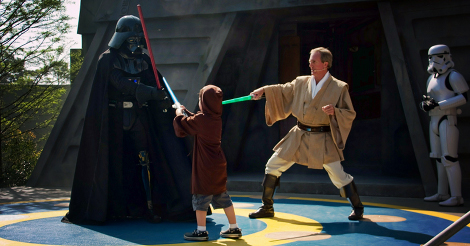
DJ asks:
Why and when should we start mentoring and investing in those younger or at a less advanced place than we are academically?
We’re getting a new Star Wars film in a few weeks. The series has a strong focus on legacies and the training of future generations, which I’m sure will continue in Episode VII. (I have no inside information; I just get a strong ‘passing the torch’ vibe from trailer.) In the original trilogy, everyone wants a chance to train the last of the Jedi. Yet in The Empire Strikes Back, Yoda complains that Luke is too old to begin training. At the time, it seemed like a bit of reverse psychology to help Luke discover for himself just how strongly he wants to become a Jedi. It wasn’t until the prequels that we learned Jedi training starts around 3 or 4.
If starting young is good enough for the Jedi, I think it’s good enough for academia too. My own mentoring started very early. Both of my parents allowed me to get some career experience when I was young. My mom was a teacher at my elementary school, so I was always hanging around at her job. She’d put me to work filing and copying, then grading, and ultimately helping her teach now and again (my favorite “lesson” was helping her students make gingerbread houses).
My dad was a college textbook editor. He started me out proofreading manuscripts. Later, I’d accompany him to the office and get some hands-on time with publishing software and assist with some basic production tasks. He also reviewed my school papers, pushing me to improve my clarity of thought and hone my communication skills.
If kids can benefit from mentoring, then just about anyone at any stage of their academic career has something to offer as a mentor. Not a parent? Other people’s kids might benefit from your mentoring. I remember a biologist at my church talking to 10-12 year-old me about his work and about science career opportunities, and a neighbor taking me to his lab for a day to do a little experiment (and singe off some hair with a Bunsen burner!). These may not be tenure-making activities, but they can be formative moments for future academics.
What were your earliest experiences being mentored?
Andy has worn many hats in his life. He knows this is a dreadfully clichéd notion, but since it is also literally true he uses it anyway. Among his current metaphorical hats: husband of one wife, father of two teenagers, reader of science fiction and science fact, enthusiast of contemporary symphonic music, and chief science officer. Previous metaphorical hats include: comp bio postdoc, molecular biology grad student, InterVarsity chapter president (that one came with a literal hat), music store clerk, house painter, and mosquito trapper. Among his more unique literal hats: British bobby, captain’s hats (of varying levels of authenticity) of several specific vessels, a deerstalker from 221B Baker St, and a railroad engineer’s cap. His monthly Science in Review is drawn from his weekly Science Corner posts — Wednesdays, 8am (Eastern) on the Emerging Scholars Network Blog. His book Faith across the Multiverse is available from Hendrickson.

Thanks, Andy! Love the Jedi training shot. I also think it’s great to start mentoring early. Another way this might play out a little later along in one’s career is mentoring as a grad student. Even if you’re pretty early on in your program, say a second year Masters student in a 6 year PhD, you probably know a lot about the institutional culture of your department and the basics of getting through the semester, not to mention things like where the parking office is on campus. All those things can be really valuable to someone starting their first year of grad school. And if you’re just a bit ahead of that person in the program, you remember all the challenges of starting out and are in a great position to empathize while you share ideas and tips.
Yes, exactly. I remember when I started freshman orientation, somehow I got my computer connected to the campus network on the first day, before anyone else on my hall. (This was the mid 90s, when networking wasn’t nearly as automatic as it is now.) Even though I was only a day or two ahead of everyone else, I was able to help my roommate and neighbors get their computers on the network as well. It doesn’t take much to have something to offer as a mentor.